Oli Broom set off from Lord’s Cricket Ground in London on 10 October 2009 with a plan to cycle 20,500km to Brisbane, Australia to see the cricket lover’s event of choice, the Ashes Test Series, raising money for charity as he went. He managed to complete his journey in just over a year – just in time to see the first match. And his success was matched by his countrymen, with the England team going on to win the series.
Oli only had a rough plan when he left London, with the final route being decided on the road. "I started out riding through Belgium, Luxembourg and Germany, before following the River Danube through Vienna, Budapest, Belgrade and then on to Istanbul," he says. "Cutting straight across the middle of Turkey, I passed through Eskisehir to Adana and on to Damascus in Syria, along the Dead Sea through Jordan, into Egypt and down the Nile to Sudan and Khartoum.
"By mid March I needed to be in India so I flew from Khartoum to Mumbai via Nairobi, cycled from Mumbai to Goa, then headed east across India through Hyderabad, up to Calcutta and into Dhaka, Bangladesh. In Bangladesh I got stuck, because I was unable to get a Burmese visa, so instead I flew to Chiang Mai in northern Thailand to continue south to Bangkok and all the way to Singapore through Malaysia, then Indonesia. From Jakarta I caught a boat to Darwin, then cycled to Brisbane via some back roads through Katherine, Boroloola, Mount Isa, Longeach, Roma and Toowoomba.
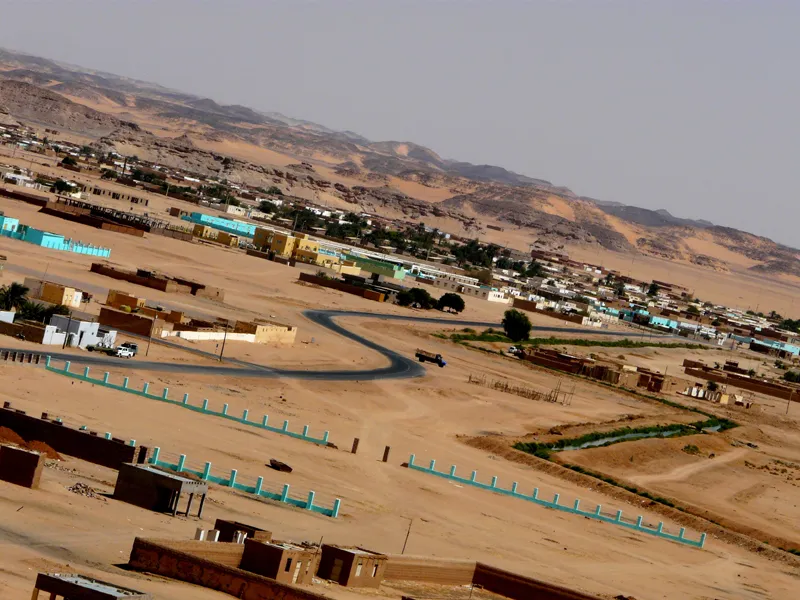
This road took Oli from Wadi Halfa (in the photo) to Khartoum in Sudan. The journey took three weeks and temperatures reached 50C
"The main drivers in my final route selection were politics and red tape. I had serious problems getting into Burma and I really wanted to avoid Pakistan – it hasn't been a good couple of years there. Instead of going through Iran and Pakistan, I thought I’d go as far down Africa as I could before the middle of March, which was all my schedule allowed."
As for what motivated him, he says: "I wanted to take on a long cycle journey for the adventure, to see the world slowly and under my own steam. But I also felt that I wanted something to cycle towards, to keep my mind busy with during my time away. The timing was perfect to cycle to the Ashes. I love cricket and I liked the slightly ridiculous notion of cycling around the world with a cricket bat strapped to my bike.”
Oli did indeed pack his bat for the duration, playing cricket as he went, sometimes with national teams, sometimes with schools. It was a great way to break the ice, and often led to raising extra money for the good causes he'd chosen to support with his ride, The Lord’s Taverners and the British Neurological Research Trust (BNRT).
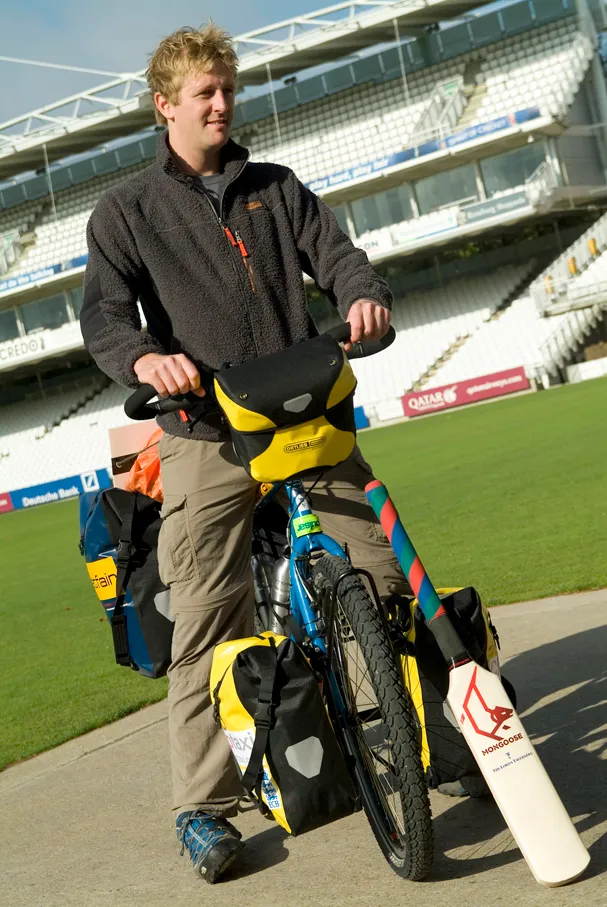
Oli about to leave Lord's in October 2009, with his trusty cricket bat
“In Indonesia I played a game on top of a mountain surrounded by volcanoes and we raised $1,000 for my charities in an auction afterwards," says Oli. "Often I'd talk to the cricketers about my journey and some of them followed my progress all the way, sometimes donating to one or other charity.
"In poorer countries I just enjoyed having a hit of cricket with strangers in villages or at their place of work. I got the feeling it was a nice surprise for a lot of the people I met to have an Englishman turn up with a cricket bat and ball (something they may never have seen before), and they seemed to enjoy it.
“I thought that as I was cycling all that way, I should raise money for people back home who aren't able to take on such a task as easily. I wanted one cricket charity, hence the Lord's Taverners, and the other charity is one a friend, James, is heavily involved with, after suffering a horrific accident six years ago that left him paralysed. So far we've raised £60,000.”
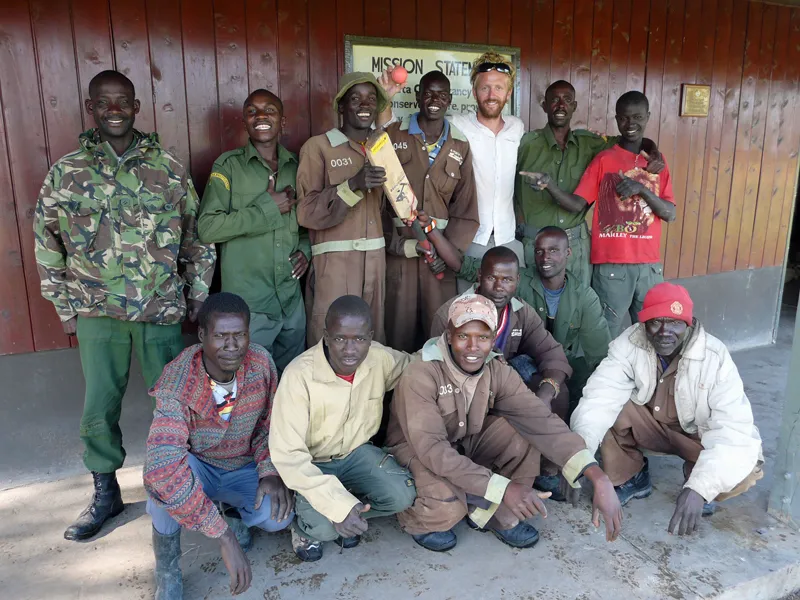
Oli with game wardens at Ol Pejeta Conservancy outside Nanyuki, Kenya
Other than the cricket bat, Oli had to choose his kit carefully. He selected a steel framed Santos Travelmaster, with Sunn Rhyno rims, butterfly bars and V-brakes as his steed of choice, and added extra bottle cages for the drier areas. Among his most invaluable kit was his odometer, bell and compass, but he’d have happily left the laptop and solar charger behind. For a good part of the journey the bike was loaded up to weigh 68kg or so, with no ill effects or mechanical mishaps. But at times it was even heavier; in rural Australia he had to carry 20 litres of water and enough food for several days.
Oli arrived in Brisbane relatively unscathed, with little in the way of serious mishaps. There was a bout of dengue fever in Thailand at the 10-month mark, and he finished his adventure with a broken finger, after injuring it playing cricket in Melbourne the day after the Boxing Day test match. But all in all, he reckons it went pretty smoothly. “I had a couple of minor accidents," he says. "In Bulgaria I was run off the road by a truck and was pretty shaken, and in India I crashed with a number of other cyclists.
"Looking back, I was very lucky not to get into more scrapes, but I think my mind grew to be so in tune with life on the road that I avoided most potential problems. I cycled with a friend for the last few weeks and noticed that I was far more aware of everything around me than he was – that wouldn't have been the case when I left London. The illness in Thailand wasn’t great and I did wonder if I'd be well enough to cycle, but my friend flew over from Borneo to cycle with me straight afterwards, so that cheered me up and seemed to put energy in my legs.”
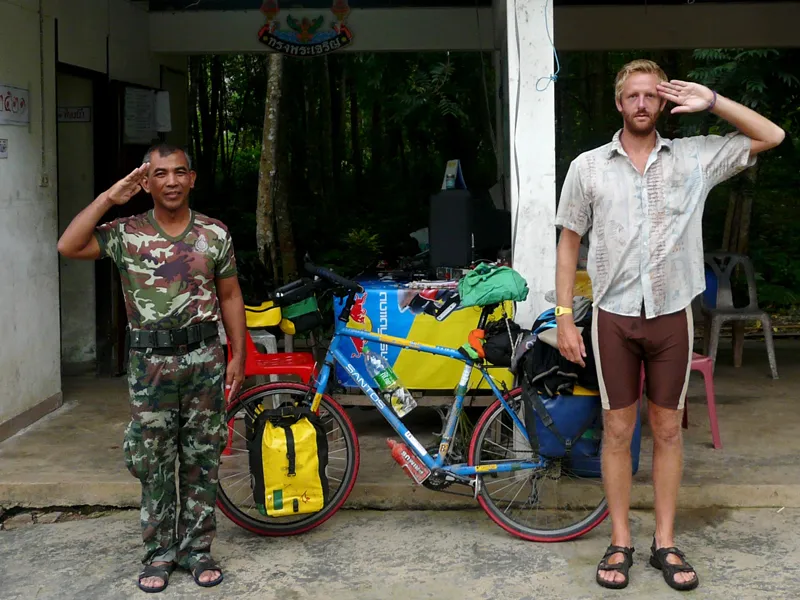
Oli about to leave a Thai military checkpoint on the Burmese border after a night's sleep there
Oli's bike lights were stolen in the first weeks of his trip – thankfully his bike was left behind – but he managed to earn a couple of replacements in Frankfurt by following a ‘treasure hunt’ to find their location. “I had nothing stolen except my bike lights," he says. "I didn’t lock my bike once between Istanbul and Darwin, and found that my trust was repaid, perhaps luckily.
"There was only one situation where I felt really uneasy, in the house of a man and his family in central Turkey. The man's brother was giving me strange looks, he had a loaded gun, and stupidly I had my video camera and camera both out. I decided that, despite a storm blowing outside, I'd leave the house and carry on riding. I did and all was fine. Later that same week I had my first encounters with wild dogs in Turkey – huge Kangal dogs. At the time I remember being very scared.”
In addition to mishaps and accidents, every long-distance cyclist has to learn to cope with the miles themselves, both mentally and physically. For some the physical grind is a shock to the system, while for others, looking after their mental wellbeing can be more of an uphill struggle than the actual physical ascents.
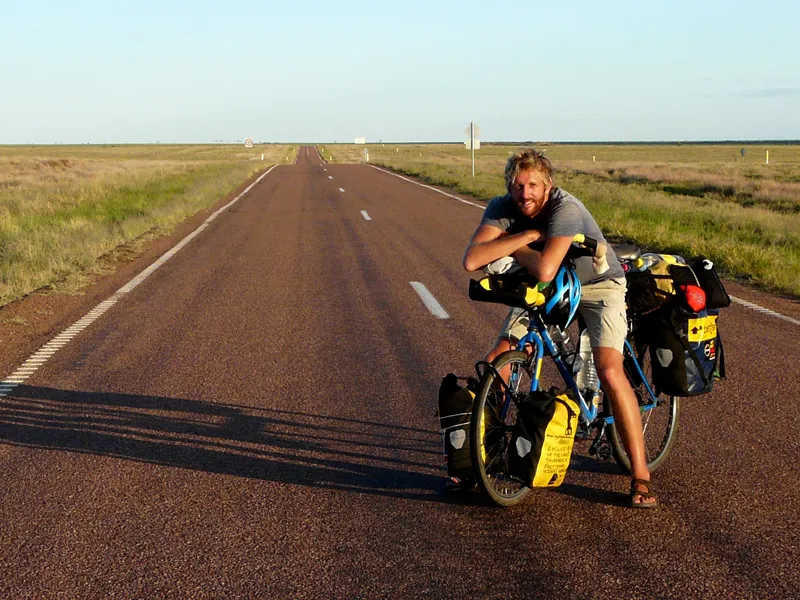
Long stretches of Outback road in Australia proved particularly tough for Oli
“Apart from a couple of weeks at the start and for about six weeks after I had dengue fever, I was rarely physically exhausted," says Oli. "I normally coped okay with the physical side of the ride. I found the mental side much harder to deal with. For example, I could never get away from people in India, and found that very hard to deal with, especially as the bike had, until that time, been a sort of escape for me, a bolthole. In India I was rarely alone, even when cycling.
"When I was halfway across Australia I just wanted to be in Brisbane watching the Ashes and having a few beers. The Outback was more of a pure test than anywhere else, because there's so little to see and do. I cycled into often very strong headwinds. I found it hard to get my head around the fact that I would have to face these winds for two months. I resorted to using a well documented technique, but it works – I just broke down each week into days, each day into hours and each hour into minutes or kilometres when the going got tough. Most of the time, though, I didn’t feel the need for that once I’d become sufficiently fit.”
The rewards of the experience more than made up for any hardships Oli had to endure. Over the course of more than a year the highlights were numerous, including the ultimate bonus of seeing England win the Ashes. “From a cricket perspective, Serbia was brilliant," he says. "Not only did I love Belgrade as a city, trying to find its feet after its turbulent recent past, but the cricketers there were incredibly passionate about the game even though they were fairly new to it. There were only a handful of ex-pats involved, most were Serbians. It was great to see.
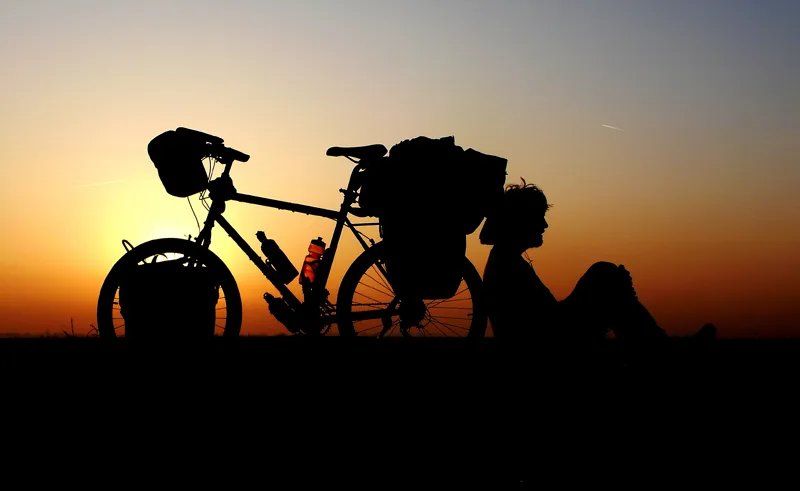
Sunset outside Belgrade in Serbia
“Arriving in Istanbul was another high point. It had rained most of the way through Europe and I felt like I was at the end of my first major leg when I arrived in Istanbul, the gateway to Asia. It was an emotional moment seeing the Bosphorous for the first time. In Sudan I cycled with four other Brits on their way from Cairo to the Football World Cup.
"We stayed with a man called Mohammed for a couple of nights and I've never experienced such warmth or generosity from someone with so little before. When we were due to leave, Mohammed was nowhere to be seen. His sisters didn’t know where he was either. Then he came through the door of his house carrying a goody bag for each of us full of food and drinks, before sending us on our way.
“The hospitality we received in Queensland, Australia would have to rank as one of the highest of the high points. I was joined in Winton by a Hungarian filmmaker friend and we attended a barbecue in Longreach, after I'd been told to get in touch with a local lady there. From that barbecue, we were given somewhere to sleep almost every night all the way to Brisbane, 1,500km away. People let us stay in their houses while they weren’t there, fed us, showed us their favourite places – it was amazing and a real Aussie Outback encounter.”

Oli with England cricket captain Andrew Strauss at Brisbane Cricket Ground, also known as The Gabba
So, would Oli do the whole thing again? “If I were the same age, I’d do it again, but tackling Iran and Pakistan this time to make it a non-stop cycling journey. Given that I’m a bit older now, there are so many other things I want to do… the ride gave me so many ideas for the future. What’s next? Definitely not life as a chartered surveyor [Oli's old job] – that would be a step backwards for me.
"I want to create a healthy work/life balance for myself, do something creative, possibly involving adventure/sport/travel. I'd like to be my own boss. Money would be nice, but it'll probably be secondary. I have a few ideas but the first task will be to finish the Cycling to the Ashes journey by writing a book. I’ve been talking to a couple of publishers but nothing’s finalised yet. I’ll be getting onto them straight away now I’m back.”
And what about the bike? Mothballs or everyday transport? "I hadn’t sat on a saddle for nine months when I cycled off from Lord's on 10 October 2009, but I'll certainly keep cycling. I want to get involved in some sort of cycling movement in London. The bicycle is the future of city transport. Lots of people like riding because it keeps them fit and healthy, but I'm a big fan of the bike as a mode of transport. I wish more people in London would take more of a Dutch or Scandinavian attitude to cycling, and enjoy it for what it can be – a relaxed, hassle-free way to get about. Possibly easier said than done in London though..."
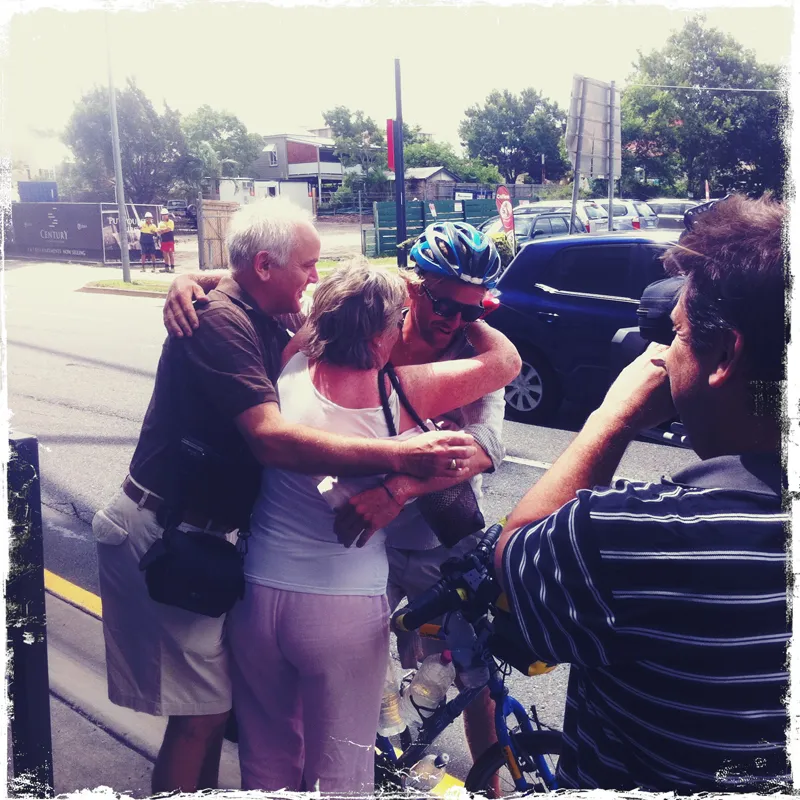
Oli is reunited with his mum and dad in Brisbane
